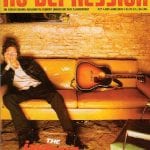Echo All Over the World
When Richard Martin and Meagan Hennessey talk about releasing records from the ’90s, they mean the 1890s.
The two co-owners of Archeophone, a Bloomington, Indiana, label, are spending their savings reissuing records originally released on cylinders, as well as early 20th-century material that first appeared on 78s. But their venture isn’t a nostalgia trip; Archeophone’s mission is to critically examine the cultural and historical context of these recordings, whether it’s Prohibition-era blues on 1920: Even The Water’s Weaker or the overt racism heard of “A Coon Band Contest” on Real Ragtime.
“It’s starting to get expensive, but these are cool to have,” says Martin, who has been collecting these relics for just over two years. “Other people should have the benefit of hearing them.” Each of the discs’ liner notes is exhaustive and includes historical and cultural information about the songs, plus recording dates, artist biographies and matrix numbers. 1920 explores the xenophobia and puritanical fervor that gripped postwar America, while Real Ragtime reveals the unusual instrumentation that characterized ragtime’s heyday from 1898 to 1922: not piano, but banjo, accordion and xylophone.
The most curious compilation in Archeophone’s catalog is The Pink Lambert: A Collection Of The First Celluloid Cylinders, a 22-track disc that presents the Lambert Company’s releases of 1902 and 1903. Its songs reflect the whimsical sensibilities of a burgeoning record industry that was keen to record just about anything: comic sketches, whistling solos, full bands or vocal quartets.
The disc features several patriotic war songs, many written during the mid-19th century, plus rousing Southern anthems such as “Dixie Land” and “Sing Me A Song Of The South”. The busiest act on the label, the American Quartet, is featured on many numbers, including the a cappella hymn “Lead Kindly Light”, written by Cardinal John Henry Newman. Other more playful cuts include the standard “In The Good Old Summer Time”, Steve Porter’s “An Armful Of Kittens And Cat” (complete with fake meowing), and Joe Belmont’s “Bird Imitations”, which is just that — the artist whistles robin and wild mockingbird calls over a piano riff.
Martin stumbled upon this find at an estate sale at Kenny Bland’s Auction Barn in Whitehall, Indiana. Martin bid on, and won, a crate of 22 pink cylinders, all in their original boxes. As it turned out, these nearly century-old products of the Lambert Company of Chicago are among the rarest and highly sought-after cylinder recordings.
In the 1900s, Thomas Lambert claimed his celluloid cylinders were indestructible (CD manufacturers of the 1980s made the same promise), and while that’s not entirely true, these pink tubes have endured remarkably well (we’ll see if CDs are around in 2100). The recordings have a slight wobbling sound — the Lambert cylinders weren’t pressed perfectly round — but the orchestras and vocalists cut through the expected amount of surface noise.
Lambert’s pink cylinders are just a fraction of Martin and Hennessey’s collection. A shelf in their home is lined with rows of paper tubes emblazoned with the face of Thomas Edison (who sought to stop Lambert from producing cylinders, but lost in court) and the motto: “Echo all over the world.”
Lift the lids and you’ll see cylinders of different colors and compounds, from shellac to wax to celluloid. Except for a little mold, all are in remarkably good shape for having hung around 100 years. Caramel cylinders date to the 1890s; brown wax were manufactured at the turn of century. Other rarities include blue ambers, which, like their pink counterparts, are made of celluloid. The running time of most cylinders is either two or four minutes, although a few rare ones tick in at three.
In transferring cylinder or 78 recordings to disc, Martin has left some of the sonic imperfections; it can take three to five hours just to smooth over 30 seconds of a recording. He plays the recordings on their respective equipment, runs them through an electronic pickup to a computer, and then, using software such as Cool Edit, painstakingly removes distortion from decades of mold or manually smooths over a chunk in a groove.
“This is a scratch we’ve come to love,” Martin says, as he works over a glitch in a Bert Williams song.
“If you don’t know what you’re doing,” Hennessey explains, “You can kill parts of legitimate sounds.”
There is a schism in the collecting community about refurbishing these lost recordings. Some purists believe tinkering with the highs and lows or erasing surface noise amounts to blasphemy.
“There are technophobes in the collecting community,” Martin acknowledges. “Few people attempt this with acoustic-era records, but when they’re done well, the beauty is stunning. You have to find a philosophy you’re comfortable with.”
Another philosophy Martin and Hennessey have had to grapple with is the offensive lyrical content of many of the recordings, especially the “coon songs”, which include the London Concert Orchestra’s “In Coonland” and the American Quartet’s “Steamboat Leaving The Wharf At New Orleans” (both on the Pink Lambert disc).
“The way I deal with it is not the way a lot of nervous people deal with it,” says Martin, who put a warning sticker on Pink Lambert regarding some of its content. “It’s a contradiction; the values are horrid and we loathe it on an intellectual level, but we still tap our feet. We have to admit it was catchy.
“We can study it and not be hypocrites. At the heart of the matter, we have let the record speak for itself.”




